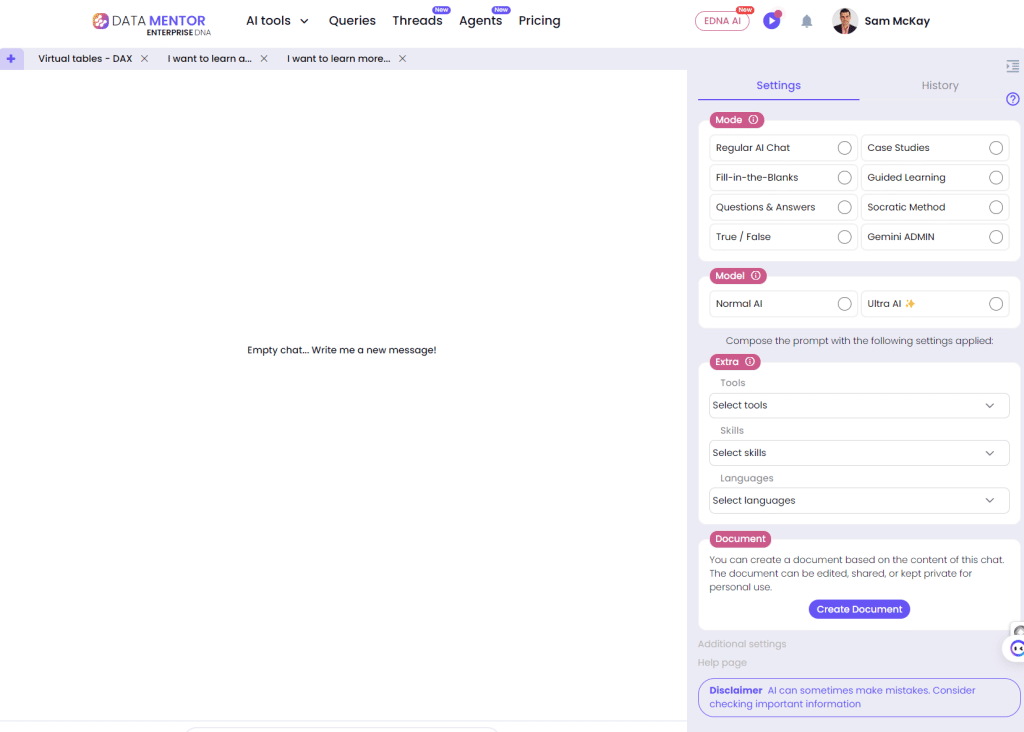Artificial Intelligence (AI) is one of the most dynamic and rapidly evolving fields in the tech industry. To stay ahead in this ever-changing landscape, it’s crucial for AI professionals to adopt a continuous learning mindset.
Continuous learning in AI is the process of constantly updating your knowledge and skills in AI to keep up with new developments and breakthroughs. It’s an essential practice for AI professionals who want to remain competitive in the industry and deliver the most innovative solutions to their clients.
This article will help you understand what continuous learning in AI is and why it’s essential to your success. We’ll also share some useful tips to help you incorporate continuous learning into your routine.
So, let’s get started!
What is Continuous Learning in AI?

Continuous learning in AI is the practice of staying up-to-date with the latest developments and breakthroughs in the field. This means always being on the lookout for new techniques, tools, and resources that can help you improve your AI skills.
In a field as fast-paced as AI, it’s not enough to learn something once and consider yourself done. The tools and techniques you’re using today might be outdated tomorrow. This is why it’s essential to adopt a continuous learning mindset.
3 Key Components of Continuous Learning in AI
Continuous learning in AI is not just about keeping up with the latest research; it’s also about refining your existing skills and expanding your knowledge base.
There are three key components to continuous learning in AI: staying informed, honing your skills, and expanding your expertise.
- Staying informed: This involves keeping up with the latest AI news, attending conferences, and reading research papers. You need to know what’s happening in the field to adapt your skills and stay relevant.
- Honing your skills: This involves practicing your AI techniques and tools. You can do this by working on personal projects, competing in data science competitions, or doing exercises on platforms like Kaggle.
- Expanding your expertise: This involves learning new tools, techniques, and areas of AI. For example, if you’re a data scientist, you might want to learn about the latest deep learning algorithms. If you’re a machine learning engineer, you might want to learn about the latest techniques for working with large datasets.
By staying informed, honing your skills, and expanding your expertise, you can ensure that you’re always at the top of your game in the fast-paced world of AI.
Why is Continuous Learning Important in AI?

The field of AI is one of the most dynamic and rapidly evolving fields in the tech industry. To stay ahead in this ever-changing landscape, it’s crucial for AI professionals to adopt a continuous learning mindset.
Here are some reasons why continuous learning in AI is essential:
1. Keeps you updated with the latest trends
AI is an incredibly fast-paced field. New algorithms, tools, and frameworks are being developed all the time. By adopting a continuous learning mindset, you can ensure that you’re always aware of the latest developments.
2. Improves your skills and knowledge
Continuous learning allows you to refine your existing skills and expand your knowledge base. This not only makes you a more valuable employee but also helps you stay competitive in the job market.
3. Enhances your problem-solving abilities
The more you learn, the more tools and techniques you have at your disposal. This allows you to approach problems from different angles and come up with more creative and effective solutions.
4. Makes you more adaptable
In a field as fast-paced as AI, things can change in the blink of an eye. By continuously learning, you can adapt to these changes more quickly and easily.
5. Leads to better decision-making
As you learn more about AI, you’ll develop a deeper understanding of the field. This will allow you to make more informed decisions about which tools and techniques are best suited for a given problem.
In summary, continuous learning in AI is not just a nice-to-have; it’s essential for anyone who wants to succeed in this field. By staying updated, improving your skills, and remaining adaptable, you can ensure that you’re always at the forefront of the AI revolution.
How to Implement Continuous Learning in AI

Incorporating continuous learning in AI into your daily routine is crucial to your success in this fast-evolving field. Here are some tips to help you do just that:
1. Develop a Learning Plan
One of the first steps in your continuous learning journey should be to create a personalized learning plan. This plan will help you identify your goals, strengths, and weaknesses. It will also help you identify the resources you need to achieve those goals.
Your learning plan should include:
- Specific learning objectives
- Milestones
- A list of resources (e.g., courses, books, online tutorials, etc.)
- A schedule
2. Stay Informed
The field of AI is constantly evolving, with new research, tools, and techniques being developed all the time. Staying informed is crucial to keeping up with the latest advancements in AI.
Some ways to stay informed include:
- Subscribing to AI newsletters and publications
- Following AI researchers, professionals, and organizations on social media
- Joining AI forums and communities
- Attending AI conferences and workshops
- Reading research papers
3. Develop Practical Skills
To become proficient in AI, it’s important to develop practical skills. This includes:
- Learning how to use AI tools and software
- Working on real-world projects
- Practicing with AI datasets
- Participating in AI competitions and challenges
4. Network with Peers
Networking is a valuable part of continuous learning in AI. By connecting with other professionals in the field, you can:
- Share knowledge and experiences
- Learn from others
- Get advice and feedback
- Stay up-to-date on the latest industry trends
- Find potential collaborators or job opportunities
5. Reflect on Your Learning
Finally, it’s important to reflect on your learning regularly. This can help you identify areas where you need to improve, as well as recognize your progress and achievements. Some ways to reflect on your learning include:
- Keeping a learning journal
- Setting regular checkpoints to assess your progress
- Seeking feedback from peers and mentors
By incorporating these tips into your daily routine, you can successfully implement continuous learning in AI and stay ahead in this dynamic and exciting field.
Final Thoughts

Continuous learning in AI is not just a choice; it’s a necessity in a field that’s constantly evolving. By adopting a continuous learning mindset, you’re not only keeping up with the latest advancements in AI, but you’re also staying competitive in the job market.
So, whether you’re just starting your AI journey or you’re a seasoned professional, remember to always be learning. Embrace new challenges, seek out new knowledge, and never stop growing. That’s the key to success in the fast-paced world of AI.
To learn more about how AI professionals are learning to stay ahead in their careers check out EDNA AI – Your personalized AI tutor!

Frequently Asked Questions

What are some continuous learning strategies for AI?
To keep up with the latest AI trends and developments, consider taking online courses, participating in workshops and seminars, and networking with other AI professionals. Read research papers, subscribe to AI newsletters, and follow AI blogs to stay informed.
How does continuous learning affect the AI field?
Continuous learning is essential in the AI field because the technology is constantly evolving. To remain relevant, AI professionals need to continuously update their skills and knowledge to keep up with the latest trends and advancements.
How can I stay current with AI advancements and trends?
Stay current by regularly reading AI news and blogs, subscribing to AI newsletters, and following AI experts on social media. Attend AI conferences and webinars, participate in online forums, and take part in AI competitions.
Why is it important for AI professionals to continuously update their skills?
The technology in the AI field is rapidly advancing. To remain competitive and deliver innovative solutions, AI professionals must continuously update their skills and knowledge. Staying current allows them to work with the latest tools and techniques.
What are the benefits of continuous learning in AI?
Continuous learning in AI allows professionals to remain competitive in the job market. It also helps them develop a deeper understanding of the field, which can lead to more creative and effective solutions. Staying current with the latest advancements ensures that they can work with the most cutting-edge tools and techniques.







